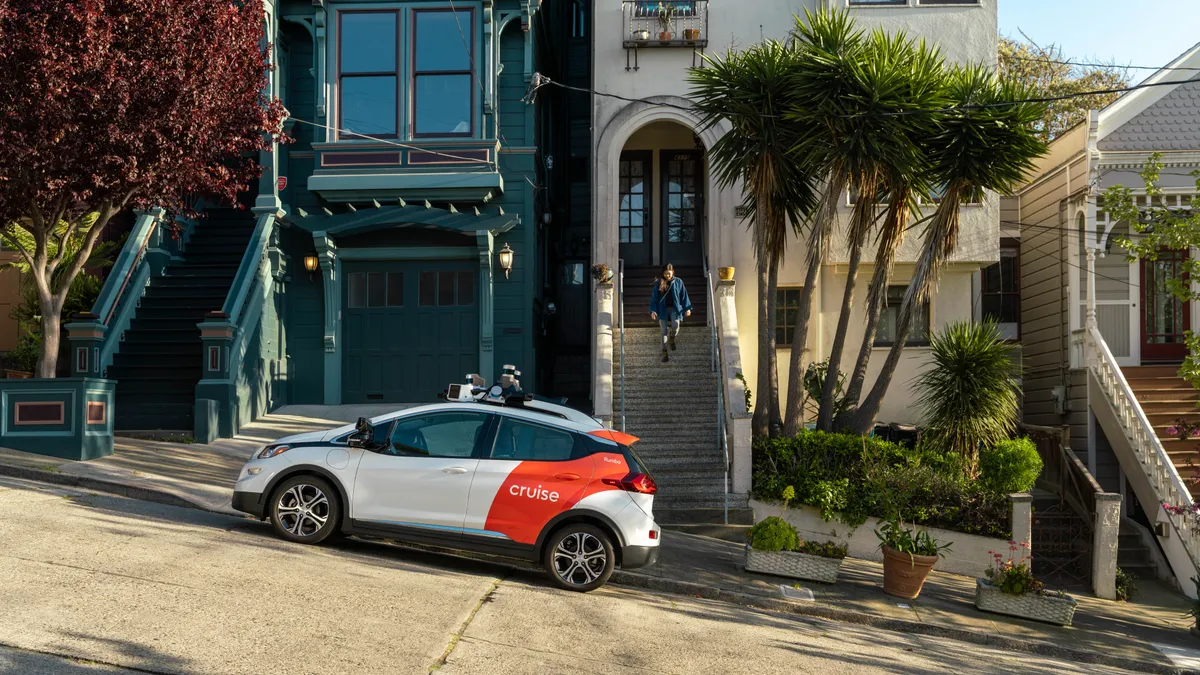General Motors’ autonomous vehicle subsidiary, Cruise, has asked the California Department of Motor Vehicles for permission to test its robotaxi service throughout the state, a Cruise spokesperson told Smart Cities Dive via email. The company operates driverless ride-hailing vehicles in San Francisco.
The California DMV limits Cruise to operating within a 7-by-7-mile area of San Francisco from 10 p.m. to 5:30 a.m. at speeds up to 30 mph. Cruise vehicles carried 26,000 passengers in San Francisco last year, according to a company report issued Thursday.
According to the spokesperson, the testing permit would allow its cars to travel at speeds up to 55 mph, but Cruise employees would be the only riders allowed. The company would need to apply for additional permits from the DMV and the California Public Utilities Commission for commercial service. The Cruise spokesperson said they have not made any decision to test their service elsewhere in California.
“While this application doesn’t represent any immediate change to our testing or operations, we hope to continue working with the California DMV to safely and responsibly test our services in other cities in the future. This is the first step in that process,” the spokesperson said. The permitting process in California can be lengthy, the spokesperson said, explaining the need to plan ahead.
Cruise uses customized versions of Chevy Bolt electric vehicles, which have racked up 2.7 million zero-emission miles across the three cities where they operate: Austin, Texas, Phoenix and San Francisco, it says in its latest report.
A newly-designed, purpose-built autonomous vehicle called Origin will start testing soon in Austin, according to a tweet by Cruise. The side-entry vehicle is designed for ride-sharing and delivery services and is wheelchair-accessible. According to the Cruise website, it will also provide audio and visual cues for low-vision, blind, hearing-impaired or deaf riders.
Just announced at #SXSW: Our new, purpose-built vehicles will begin testing on Austin streets in the coming weeks and become available for rides soon!
— cruise (@Cruise) March 14, 2023
Check them out: https://t.co/EQzybyohaV pic.twitter.com/sTjExJRMC7
Cruise, Waymo and Nuro are the only three companies with permits from the California DMV to operate driverless vehicles in the state; other companies have received permits for testing, either with or without a driver. Nuro only provides autonomous delivery. Waymo received a permit to transport passengers in driverless vehicles in San Francisco last year and announced plans to enter Los Angeles in the coming months.
The Cruise driverless service in San Francisco got off to a rough start. The National Highway Traffic Safety Administration opened an investigation in December into Cruise vehicles’ automated driving system following reports of improper hard-braking maneuvers and vehicles coming to a standstill on the road, potentially stranding passengers. The investigation is ongoing.
In a November report, Cruise outlined its safety measures and procedures, noting that its autonomous vehicles obey traffic rules, don’t exceed speed limits and can’t get distracted. Louise Zhang, Cruise vice president for safety and systems, said in a blog post, “Since the beginning of our driverless operations, Cruise’s safety record has been publicly reported to regulators and updated online.”












